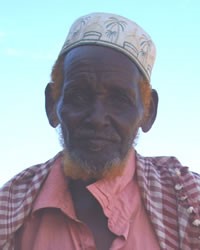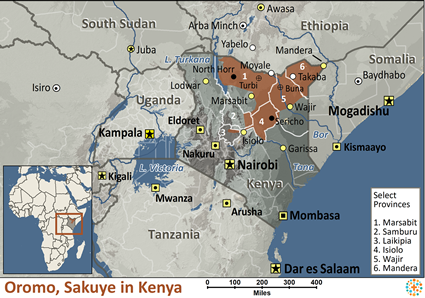According to oral history, up to ten generations came from their center in Dabel and migrated to Elwak and other places in search of pasture for their animals, yet they keep coming back once a year to a type of yearly Passover like that of the Israelites. They are Cushitic. There is a possibility that they came from Somalia through Alwak to their present area in Dabel. This group occupies the Eastern Province of Kenya in the Moyale District close to the boundary of the Northeastern Province. Their main center is still in Dabel. They speak Borana and are related to the Rendille people. Oral history has it that they lived under the kingship of the Rendille before there was a conflict related to pastureland which resulted in them breaking into a separate tribe. Due to the places they have passed through, the Sakuye Oromo speak Borana, which is the common language in the area.
The Oromo are a large cluster of peoples. One of their subgroups is the Sakuye Oromo.
Traditionally the Sakuye Oromo kept camels, cows and goats. However today they have embraced subsistence farming. They were traditionally nomadic. They use Dagora (cloth) which they wrap around themselves from hip downwards and a lot of ornaments on their heads which they call "Shabat." This is especially true when the Sakuye Oromo are ready to get married. This cloth was only white and worn in ceremonies. They also used to comb their hair nicely and divide it into two at the middle of their head.
Female Genital Mutilation (FGM) is a rite of passage as well as circumcision for boys at age seven. Boys marry as teenagers, although girls could be married at any age up to 12 years of age. This is done especially through negotiation with parents. Anybody who reaches the age of FGM and circumcision and is not married is scorned and rejected. If a young marriageable girl accused a boy of even greeting her, that person would have a case to answer even if it was only greetings. Only married females are supposed to speak to men.
The Sakuye Oromo follow traditional Islam mixed with animism; they even have a shrine in Dabel as well as family shrines. They would rather speak of other things due to their Islamic roots which frown on such things.
The Sakuye Oromo are in constant conflict with their neighbors. They also need water for both sanitation and animals. They have limited exposure to Christianity. They have had exposure to shepherd ministry for the last ten years.
Ask the Prince of Peace to reign in their midst and that they would experience a movement to Christ soon.
Pray for rain for livestock and for their farms and showers of spiritual blessings upon the lives of the Sakuye Oromo community.
Pray for Holy Spirit directed workers to be thrust out to the Sakuye Oromo people.
Scripture Prayers for the Oromo, Sakuye in Kenya.
| Profile Source: Joshua Project |

























